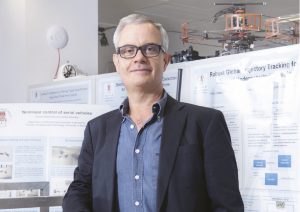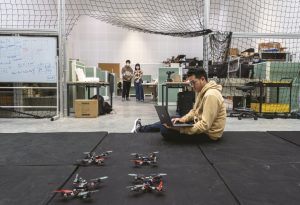Electrical and Computer Engineering (ECE) education aims to nurture professionals in electrical, electronic, and computer engineering. In recent years, the University of Macau (UM) has introduced cutting-edge programmes that integrate interdisciplinary approaches to push beyond traditional knowledge boundaries. By incorporating advanced technologies such as artificial intelligence (AI) into courses, the university strives to broaden students’ professional horizons. These initiatives equip UM graduates to succeed as practitioners and entrepreneurs in the Greater Bay Area.
Fostering Innovation Through Interdisciplinary Collaboration
In an era of rapid technological advancements, transformative technologies such as AI, the Internet of Things (IoT), microelectronics, and smart grids are reshaping industries across the globe. In response, UM places strong emphasis on interdisciplinary education. The university’s ECE programmes integrate knowledge from diverse fields, including biomedical engineering, electric power engineering and automation, microelectronics, wireless communications, IoT, and intelligent control systems.
According to Prof Carlos Silvestre, head of the Department of Electrical and Computer Engineering, UM’s ECE programmes go beyond traditional engineering education by incorporating emerging technologies. For example, the department has introduced courses on AI principles, data analysis for IoT, and cloud computing. It also maintains close collaboration with the State Key Laboratory of Internet of Things for Smart City and State Key Laboratory of Analog and Mixed-Signal VLSI, and industry partners to ensure that students acquire both foundational and cutting-edge knowledge while developing a forward-looking understanding of industry trends. Prof Silvestre explains, ‘In this era marked by rapid technological advancements, our programmes must stay aligned with these developments to ensure that students can effectively apply their knowledge in real-world contexts.’
Focusing on Both Theoretical Learning and Practical Skills
To enhance students’ practical skills, the Department of Electrical and Computer Engineering has established state-of-the-art facilities, including laboratories for embedded systems, control, and wireless communication. These labs are equipped with industry-standard tools such as Python, TensorFlow, and MATLAB, allowing students to gain hands-on experience in areas such as smart system development, control, microelectronics, smart grids, and biomedical engineering. This setup ensures a seamless integration of theoretical knowledge with practical application.
Li Haobo, a third-year student, shares his experience at UM: ‘Compared to universities in mainland China, UM places more emphasis on developing students’ practical skills. Even undergraduates are encouraged to join professors’ research teams and conduct experiments in the laboratory. This approach significantly enhances our hands-on abilities, problem-solving skills, and academic writing proficiency.’ Under the guidance of his professor, Li won first place in the preliminary round and third prize in the finals of the Youth Group Emotional BCI Competition at the 2023 World Robot Contest (WRC)—Brain-Computer Interface (BCI)—Controlled Robot Contest. As he reaches his final year of undergraduate studies, Li plans to continue his academic journey at UM by pursuing a master’s degree.
Each year, approximately 10 per cent of UM ECE students participate in local, regional, and international competitions, further enhancing their academic abilities and practical skills. Prof Silvestre adds that master’s students enjoy more opportunities to take part in internships and research projects, while doctoral students work closely with professors to conduct research and publish their findings. Additionally, the department offers extensive internship opportunities in enterprises in Macao and the Greater Bay Area.
Supporting the Development of the Greater Bay Area
UM’s ECE programmes equip students with expertise applicable to a wide range of engineering fields, including electrical building services, railway electrification systems, power systems, microelectronic integrated circuit design, wireless communication, and intelligent control. Graduates have secured roles in organisations such as Macao Light Rapid Transit Corporation, Companhia de Electricidade de Macau, and Teledifusão de Macau, working as electrical engineers, systems managers, and more. In the 2023/2024 academic year, the Department of Electrical and Computer Engineering graduated 32 bachelor’s students, 32 master’s students, and 17 PhD students. 70 per cent of graduates secured employment within two to three months following graduation, and earn an average monthly starting salary of MOP 15,000, underscoring their strong prospects in the job market. On the other hand, some graduates have pursued academic careers as faculty or researchers at prestigious institutions including Fudan University, Sun Yat-sen University, the University of Electronic Science and Technology of China, and Western University in Canada.
Xie Wei, who completed his PhD studies at UM in 2021, exemplifies the success of UM graduates. After graduation, he was selected for the China Association for Science and Technology’s Talented Young Scientist Program. Currently, he is a tenured associate professor at Shanghai Jiao Tong University, where he focuses on research on autonomous control and the design of marine and unmanned port systems. Reflecting on his time at UM, Prof Xie says, ‘UM provides state-of-the-art teaching and research facilities, which helped build a solid foundation for my academic development. More importantly, UM has exceptional faculty from around the world. They are not only academically accomplished, but also passionate and patient mentors. Now, as a mentor myself, I always look to them as role models.’
Some UM graduates have ventured into entrepreneurship and founded tech companies. One notable example is SinoKru Technology, established in Macao and later expanded to Zhuhai. The company operates a software quality control centre in Zhuhai, offering big data, geospatial information, and call centre services. Another standout example is Laxcen Technology, which was incubated at the Hengqin-Macao Youth Entrepreneurship Valley. The company specialises in IoT applications, including NFC/RFID hardware, electronic tags, and solutions for sectors like apparel, aviation, retail, logistics, supply chains, and libraries, serving clients in over 50 countries and regions.
As the Greater Bay Area continues to develop, Prof Silvestre emphasises the importance of aligning with regional needs and seizing emerging opportunities. He explains, ‘UM is well-resourced, which is one of its greatest strengths.’ In addition to curriculum reforms, the university plans to launch a new bachelor’s programme in microelectronics and a new master’s programme in smart grids. It will also dedicate more resources to cultivating talent in AI technologies, smart energy systems, microelectronics, and robotics, with the goal of supporting the Greater Bay Area’s digital transformation and sustainable development.
Text: Stella Kuan
Photo: Jack Ho, with some provided by the interviewees
English Translation: Gloria Kuok, Bess Che
Source: UMagazine ISSUE 31
Related articles:
Integrating Engineering and AI: UM’s Innovative Engineering Education






